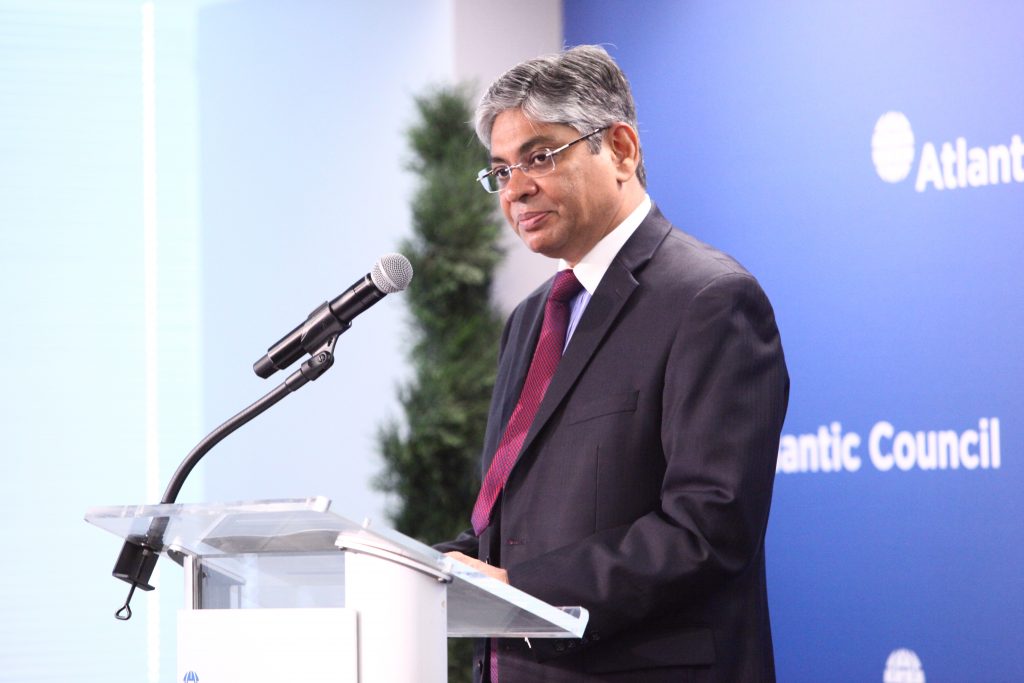On October 8, the Atlantic Council’s South Asia Center and Brent Scowcroft Center on International Security partnered with the US Department of State to host “Diplomacy Beyond the Nation-State: The Megacity Challenge.” The discussion featured a variety of global perspectives, including Ambassador of India to the United States Arun Singh, US Secretary of Housing and Development (HUD) Julian Castro, Mayor of Mexico City Miguel Ángel Mancera, and US Department of State’s Ian Klaus and Kathryn Schalow. The discussants shed light on the complex set of challenges and opportunities endemic to the 21st century megacity.
The event served as a prelude to the South Asia Center’s Megacity Security Conference taking place this November in Mumbai. The conference will convene a diverse coalition of leaders from security and law enforcement agencies, academia, think tanks, the policy world, and media groups to discuss megacity issues in the heart of one of the world’s largest megacities. Drawing on the same themes, the conference will delve deeper into the issues addressed at “Diplomacy Beyond the Nation-State.”
The emergence of megacities has presented 21st century governments with opportunities and challenges unimaginable in an earlier age. Kicking off the conversation, Ambassador of India to the United States Arun Singh astutely noted that megacities are both sources of innovation and economic expansion, as well as sources of security threats and logistical challenges. Referring to India, Ambassador Singh remarked that “having the oldest and biggest cities is not an unmitigated blessing.” India harbors 53 Indian cities with a population over one million and its two biggest cities, Mumbai and New Delhi, contain populations topping ten million. The most pressing unresolved challenge in these cities is security, as demonstrated by the 2008 Mumbai attacks. However, security concerns need to be addressed as “part of a larger strategic concept” in which “a new paradigm of working together and building habits of cooperation” between federal and city governments across nations is critical.
Following Ambassador Singh’s remarks, Secretary Castro addressed the ways in which the global community must cope with the growth of megacities. Scores of people around the world are immigrating to cities to “find a better chance at achieving their dreams.” Citing United Nations estimates, Castro noted that two-thirds of the world’s population will live in urban areas by 2050. This ongoing global phenomenon will present enormous challenges to city governments who must “lead the effort to expand opportunity” to this newly urbanized population. In his role as Secretary of HUD, Castro is leading the charge to ensure affordable housing and other infrastructure necessities to accommodate the dreams of the increasing number of urbanized Americans.
Ambassador Singh and Secretary Castro’s remarks were followed by a panel in which Mexico City Mayor Miguel Ángel Mancera discussed the details of what the two previous government officials addressed at the macro level. Speaking in Spanish, the Mayor described his efforts to address pollution, inadequate housing, and security concerns in a city of over 21 million inhabitants. “We share the public policies of the major cities of the world,” the Mayor noted referencing the way in which localized problems are common across megacities in different countries. The challenge of the megacity is so ubiquitous that no matter the rank or position, civil servants of all origins have a shared vocabulary to discuss the challenges and opportunities of this distinct 21st century facet of modern life. From ensuring security to building infrastructure to providing clean water, the megacity presents each government with a local challenge that can most adequately be addressed through sharing best practices and communication across borders. The Atlantic Council, through its continued work on megacities, seeks to provide a platform for megacity ties to coalesce.
